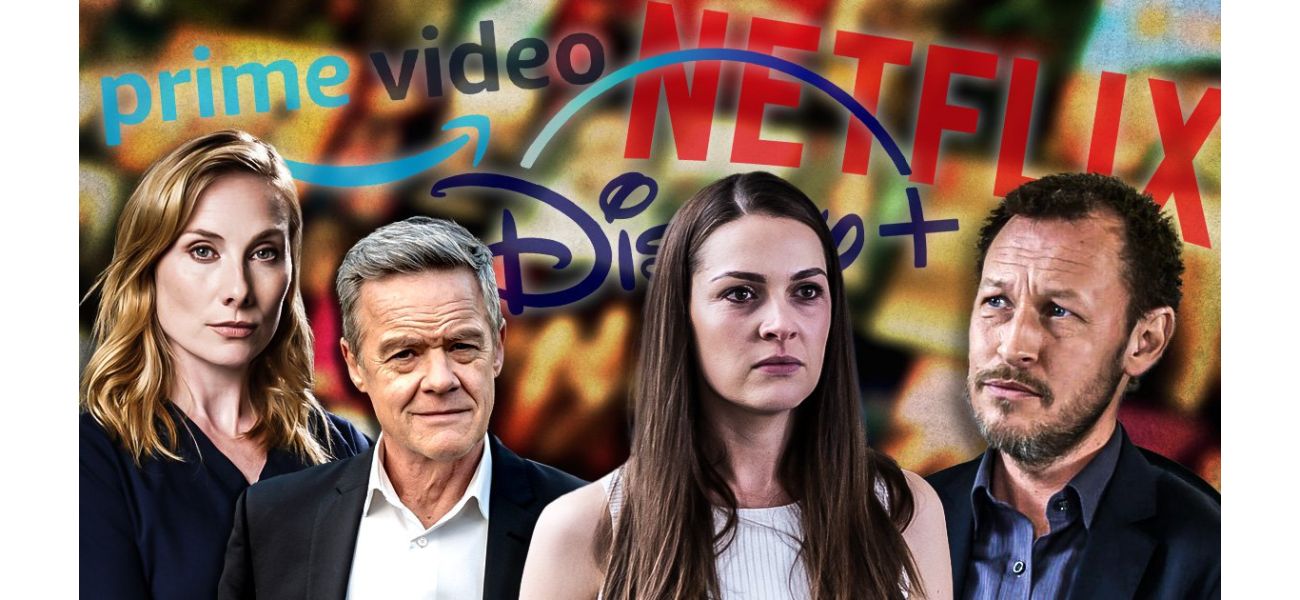Streaming's impact on soap operas and their future discussed.
TV is changing, but there's still hope.
November 19th 2024.

The world of soap operas, or "soapland" as we like to call it, has gone through some major changes recently. As a reporter who covers these beloved dramas, it's been quite a ride trying to process all of the constant shifts happening in the industry. But at the same time, it's not entirely surprising given the ever-evolving landscape of television.
Just in the past couple of years, we've seen some significant changes. The BBC made the decision to cancel two long-running shows, Holby City and Doctors, in order to save money. Meanwhile, Neighbours moved from airing on Channel 5 to a streaming site, and EastEnders, Coronation Street, and Emmerdale started uploading their episodes to a streaming platform ahead of their scheduled TV broadcast. And let's not forget about Hollyoaks, who also decided to change things up by altering their episode schedule due to the rise of online viewing.
It's all part of the bigger picture, as streaming giants like Disney+, Netflix, and Amazon Prime continue to dominate the market. And unfortunately, it's had an impact on soaps like Hollyoaks and Doctors. With the rise of short, attention-grabbing content on platforms like TikTok, it's no wonder that traditional TV shows are struggling to keep up.
But despite all of these changes, the soaps have shown that they are not afraid to fight back. When faced with a crisis, they will do everything in their power to adapt and keep their shows alive. Sadly, this wasn't enough for Holby City and Doctors, who had already been given the axe by the BBC. However, Neighbours and Hollyoaks had a different fate.
Last year, production company Fremantle Media failed to find a new home for Neighbours, leading many to believe that the show was coming to an end. But then, in a dramatic turn of events, Amazon Freevee swooped in and saved the day. Now, Neighbours is available to watch for free on this user-friendly platform, and it's been gaining popularity ever since.
And then there's Hollyoaks, who made the bold decision to reduce their weekly episode count from five to three. This change was based on research that showed younger audiences prefer watching three episodes per week due to the abundance of other content competing for their attention. It was a risky move, but it seems to be paying off. Ratings have increased, and streaming views have reached record levels.
I had the opportunity to chat with Philip Ralph, a writer for BBC's Doctors, about the changing landscape of soaps. He shared his thoughts on the importance of adapting to the current TV climate while still staying true to the core audience. It's a delicate balance, but Hollyoaks seems to have found the right formula.
As producer Hannah Cheers pointed out, soap operas are not like other TV shows. They have a loyal following, and their fans rely on them for a sense of familiarity and escape. That's why it's crucial for soaps to keep evolving and adapting, especially in the age of streaming. And it's clear that this model is working, as soaps continue to thrive and tell powerful, relevant storylines.
But with all of this change comes some negatives as well. We can't ignore the impact that axing a show to save money can have on the lives of those involved. It's a tough reality for everyone, from the actors and writers to the dedicated fans. But as we've seen, the soaps are resilient and will do whatever it takes to stay on our screens. So, while soapland may look a bit different now, it's still as entertaining and beloved as ever.
As someone who reports on the world of soap operas, I have been witnessing a lot of changes happening in the industry lately. It's a lot to process, but not entirely surprising. In the past two years alone, we have seen some major changes - the BBC has decided to end Holby City and Doctors, Neighbours has moved from airing on Channel 5 to streaming online, and popular shows like EastEnders, Coronation Street, and Emmerdale have started uploading their episodes to streaming platforms earlier than their scheduled air dates. Even Hollyoaks has changed their broadcasting style, all due to the increasing popularity of online streaming.
This shift can be attributed to the constant development and dominance of giant streaming platforms like Disney+, Netflix, and Amazon Prime. As a result, soaps like Hollyoaks and Doctors have also been impacted. With the rise of short, snappy videos on platforms like TikTok, the idea of sitting through an hour-long episode of Coronation Street may not seem as appealing to younger audiences. This has left traditional broadcasters like the BBC and ITV facing an uncertain future with shows that have been on our screens for decades.
But amidst all these changes, there have been some shows that have fought hard to stay afloat. Take EastEnders, for example. When the show first premiered in 1985, it was pulling in a whopping 20 million viewers for some episodes. However, these days, the average number of views has dropped significantly, signaling a shift in the way we consume television. But this by no means confirms the eventual downfall of these beloved shows.
In fact, the past year has shown us that soap operas are resilient in the face of crisis. Unfortunately, Holby City and Doctors were not able to survive the BBC's budget cuts and were ultimately cancelled. However, for shows like Neighbours and Hollyoaks, it was a different story. In 2022, production company Fremantle Media failed to find a new home for Neighbours and it seemed like the end for the long-running show. But the following year, Amazon Freevee stepped in to save the day and launched new episodes on their free streaming service. This move paid off, as Neighbours quickly became the number one show on UK Amazon Prime.
Similarly, Hollyoaks also took a bold step in February this year by reducing their weekly episode count from five to three. This decision was based on research that showed younger audiences, who are the show's key demographic, are more likely to watch an average of three episodes a week due to the abundance of other content competing for their attention. And so far, the risk seems to be paying off, with the show's ratings increasing by 23% from last year.
But it's not just about adapting to the changing TV landscape, it's also about not forgetting the core audience. As Philip Ralph, a writer for BBC's Doctors, puts it, "If you adapt too much, you lose your core audience. But if you don't adapt at all, you won't attract the audience you're trying to reach." He cites Hollyoaks' decision to move entirely online and reduce their episode count as an example of finding a balance between catering to their younger audience and not alienating their loyal viewers.
Producer Hannah Cheers, who works on Hollyoaks, also believes that the move to streaming has actually enhanced the relationship between fans and their favorite soaps. She explains, "A soap becomes this unconditional relationship that you have. This familiarity, this sense of escape and this support in your life. That relationship only exists with a soap because it continues." Unlike other TV series that come and go, soaps have a loyal and dedicated fan base that continues to support them through thick and thin.
But as with any major change, there are also negative impacts to consider. The decision to axe a show to save money may seem like a necessary business move, but it also has a ripple effect on the lives of those involved in the show. Actors, writers, and crew members can lose their jobs and their livelihoods. So while we celebrate the positive changes happening in soapland, let's not forget about the potential consequences that come with them.
Just in the past couple of years, we've seen some significant changes. The BBC made the decision to cancel two long-running shows, Holby City and Doctors, in order to save money. Meanwhile, Neighbours moved from airing on Channel 5 to a streaming site, and EastEnders, Coronation Street, and Emmerdale started uploading their episodes to a streaming platform ahead of their scheduled TV broadcast. And let's not forget about Hollyoaks, who also decided to change things up by altering their episode schedule due to the rise of online viewing.
It's all part of the bigger picture, as streaming giants like Disney+, Netflix, and Amazon Prime continue to dominate the market. And unfortunately, it's had an impact on soaps like Hollyoaks and Doctors. With the rise of short, attention-grabbing content on platforms like TikTok, it's no wonder that traditional TV shows are struggling to keep up.
But despite all of these changes, the soaps have shown that they are not afraid to fight back. When faced with a crisis, they will do everything in their power to adapt and keep their shows alive. Sadly, this wasn't enough for Holby City and Doctors, who had already been given the axe by the BBC. However, Neighbours and Hollyoaks had a different fate.
Last year, production company Fremantle Media failed to find a new home for Neighbours, leading many to believe that the show was coming to an end. But then, in a dramatic turn of events, Amazon Freevee swooped in and saved the day. Now, Neighbours is available to watch for free on this user-friendly platform, and it's been gaining popularity ever since.
And then there's Hollyoaks, who made the bold decision to reduce their weekly episode count from five to three. This change was based on research that showed younger audiences prefer watching three episodes per week due to the abundance of other content competing for their attention. It was a risky move, but it seems to be paying off. Ratings have increased, and streaming views have reached record levels.
I had the opportunity to chat with Philip Ralph, a writer for BBC's Doctors, about the changing landscape of soaps. He shared his thoughts on the importance of adapting to the current TV climate while still staying true to the core audience. It's a delicate balance, but Hollyoaks seems to have found the right formula.
As producer Hannah Cheers pointed out, soap operas are not like other TV shows. They have a loyal following, and their fans rely on them for a sense of familiarity and escape. That's why it's crucial for soaps to keep evolving and adapting, especially in the age of streaming. And it's clear that this model is working, as soaps continue to thrive and tell powerful, relevant storylines.
But with all of this change comes some negatives as well. We can't ignore the impact that axing a show to save money can have on the lives of those involved. It's a tough reality for everyone, from the actors and writers to the dedicated fans. But as we've seen, the soaps are resilient and will do whatever it takes to stay on our screens. So, while soapland may look a bit different now, it's still as entertaining and beloved as ever.
As someone who reports on the world of soap operas, I have been witnessing a lot of changes happening in the industry lately. It's a lot to process, but not entirely surprising. In the past two years alone, we have seen some major changes - the BBC has decided to end Holby City and Doctors, Neighbours has moved from airing on Channel 5 to streaming online, and popular shows like EastEnders, Coronation Street, and Emmerdale have started uploading their episodes to streaming platforms earlier than their scheduled air dates. Even Hollyoaks has changed their broadcasting style, all due to the increasing popularity of online streaming.
This shift can be attributed to the constant development and dominance of giant streaming platforms like Disney+, Netflix, and Amazon Prime. As a result, soaps like Hollyoaks and Doctors have also been impacted. With the rise of short, snappy videos on platforms like TikTok, the idea of sitting through an hour-long episode of Coronation Street may not seem as appealing to younger audiences. This has left traditional broadcasters like the BBC and ITV facing an uncertain future with shows that have been on our screens for decades.
But amidst all these changes, there have been some shows that have fought hard to stay afloat. Take EastEnders, for example. When the show first premiered in 1985, it was pulling in a whopping 20 million viewers for some episodes. However, these days, the average number of views has dropped significantly, signaling a shift in the way we consume television. But this by no means confirms the eventual downfall of these beloved shows.
In fact, the past year has shown us that soap operas are resilient in the face of crisis. Unfortunately, Holby City and Doctors were not able to survive the BBC's budget cuts and were ultimately cancelled. However, for shows like Neighbours and Hollyoaks, it was a different story. In 2022, production company Fremantle Media failed to find a new home for Neighbours and it seemed like the end for the long-running show. But the following year, Amazon Freevee stepped in to save the day and launched new episodes on their free streaming service. This move paid off, as Neighbours quickly became the number one show on UK Amazon Prime.
Similarly, Hollyoaks also took a bold step in February this year by reducing their weekly episode count from five to three. This decision was based on research that showed younger audiences, who are the show's key demographic, are more likely to watch an average of three episodes a week due to the abundance of other content competing for their attention. And so far, the risk seems to be paying off, with the show's ratings increasing by 23% from last year.
But it's not just about adapting to the changing TV landscape, it's also about not forgetting the core audience. As Philip Ralph, a writer for BBC's Doctors, puts it, "If you adapt too much, you lose your core audience. But if you don't adapt at all, you won't attract the audience you're trying to reach." He cites Hollyoaks' decision to move entirely online and reduce their episode count as an example of finding a balance between catering to their younger audience and not alienating their loyal viewers.
Producer Hannah Cheers, who works on Hollyoaks, also believes that the move to streaming has actually enhanced the relationship between fans and their favorite soaps. She explains, "A soap becomes this unconditional relationship that you have. This familiarity, this sense of escape and this support in your life. That relationship only exists with a soap because it continues." Unlike other TV series that come and go, soaps have a loyal and dedicated fan base that continues to support them through thick and thin.
But as with any major change, there are also negative impacts to consider. The decision to axe a show to save money may seem like a necessary business move, but it also has a ripple effect on the lives of those involved in the show. Actors, writers, and crew members can lose their jobs and their livelihoods. So while we celebrate the positive changes happening in soapland, let's not forget about the potential consequences that come with them.
[This article has been trending online recently and has been generated with AI. Your feed is customized.]
[Generative AI is experimental.]
0
0
Submit Comment





